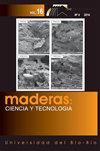用可见和近红外光谱法预测木材的能量特性
IF 1.5
4区 农林科学
Q2 Agricultural and Biological Sciences
引用次数: 0
摘要
木材可以直接用作燃料,也可以作为其他燃料的原料;然而,有必要对其能量特性进行评估,以确保该材料的最佳使用。要分析的最相关的特征是较高的热值、挥发性物质含量、固定碳含量和灰分含量。除了传统方法外,还有针对速度和可靠性进行优化的非破坏性评估。在这些方法中,可见光谱和近红外光谱已被证明对几种木材性质的预测是稳健的。本研究的目的是评价可见光光谱和近红外光谱在盐叶桉、dunnii桉和benthamii桉的树种识别和高热值、挥发性物质含量、固定碳含量和灰分含量预测中的潜力。为此,对所收集的光谱进行多元主成分分析和偏最小二乘回归。主成分分析可以很好地分辨出这三个物种,解释了99%的可见光谱方差和73%的近红外光谱方差。通过偏最小二乘回归对可见光光谱和近红外光谱的能量值进行了较好的估计,校正R²值接近1,误差较小。本文章由计算机程序翻译,如有差异,请以英文原文为准。
Performance of visible and Near-infrared spectroscopy to predict the energetic properties of wood
Wood can be used for fuel by direct burning, or as a raw material for other fuels; however, it is necessary to evaluate the energy properties to ensure the optimal use of this material. The most relevant characteristics to be analyzed are the higher heating value, volatile material content, fixed carbon content, and ash content. Along with the traditional methods, there are also non-destructive evaluations that are optimized for speed and reliability. Among these methods, visible spectroscopy and near-infrared spectroscopy have been proven to be robust for the prediction of several wood properties. The aim of this study was to evaluate the potential of visible spectroscopy and near-infrared spectroscopy for species discrimination and prediction of higher heating value, volatile material content, fixed carbon content, and ash content for Eucalyptus saligna, Eucalyptus dunnii, and Eucalyptus benthamii woods. For this purpose, multivariate principal component analysis and partial least squares regression were applied to the collected spectra. The principal component analysis satisfactorily discriminated the three species, explaining 99% of the variance of the visible spectroscopy spectra and 73% of that of the near-infrared spectra. The estimation of energetic properties through partial least squares regression was satisfactory for both visible spectroscopy and near-infrared spectroscopies, which presented calibration R² values close to 1 and low errors for all properties studied.
求助全文
通过发布文献求助,成功后即可免费获取论文全文。
去求助
来源期刊

Maderas-Ciencia Y Tecnologia
MATERIALS SCIENCE, PAPER & WOOD-
CiteScore
2.80
自引率
13.30%
发文量
33
审稿时长
>12 weeks
期刊介绍:
Maderas-Cienc Tecnol publishes inedits and original research articles in Spanish and English. The contributions for their publication should be unpublished and the journal is reserved all the rights of reproduction of the content of the same ones. All the articles are subjected to evaluation to the Publishing Committee or external consultants. At least two reviewers under double blind system. Previous acceptance of the Publishing Committee, summaries of thesis of Magíster and Doctorate are also published, technical opinions, revision of books and reports of congresses, related with the Science and the Technology of the Wood. The journal have not articles processing and submission charges.
 求助内容:
求助内容: 应助结果提醒方式:
应助结果提醒方式:


